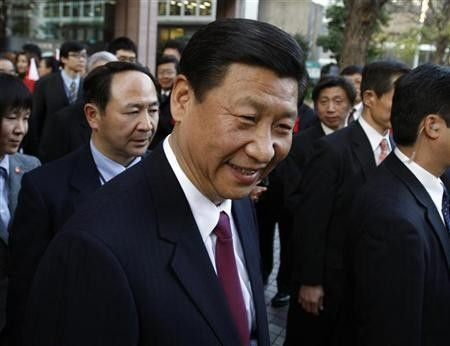Xi Jinping, Next Chinese Leader, to Visit Obama in February

The man pegged to become the next leader of China, Vice President Xi Jinping will meet with U.S. President Barack Obama in Washington D.C. on Valentine’s Day, according to White House, to discuss a broad range of bilateral, regional, and global issues.”
Xi, 58, will also meet with Vice-President Joe Biden and make trips to California and Iowa.
Last summer, Xi met with Biden in China, in order to establish some familiarity between Washington and the presumed next leader in Beijing. Xi is widely expected to assume the mantle of Community Party boss by the end of this year when Hu Jintao steps down and then become China’s president in 2013 following Hu’s retirement.
According to reports, Xi is largely an unknown entity to U.S. officials.
Kenneth Lieberthal, a Chinese expert at the Brookings Institution in Washington, told Reuters: This is really a chance for the Obama administration to look forward to the succession and post-succession period in China and begin to establish critical personal relationships and a personal comfort level back and forth. Obama and Xi will surely have a full plate – apart from Washington’s continuing unease over China’s efforts to keep its Yuan currency undervalued, the U.S. will also likely pressure Beijing to offer some support for Western sanctions upon Iran.
China has criticized the U.S. and the European Union for imposing economic sanctions on Teheran, although Beijing officials have also warned the Iranians against developing nuclear weapons.
The Chinese are Iran’s number one customer for crude oil, yet Beijing has of late reduced its import quota from the Islamic Republic.
U.S. Treasury Secretary Timothy Geithner, who journeyed to Beijing in early January, failed to receive a firm commitment from Chinese officials that they will cooperate on Iranian sanctions.
Separately, China has its own geo-strategic concerns in its backyard, having expressed dismay over America’s growing military presence in East Asia, having scaled back operations in Iraq and Afghanistan. Xi will also likely scold Obama for recent arms sales to Taiwan, which China claims as its own territory.
Gary Locke, the U.S. ambassador to China, said of Xi during a recent television interview on PBS: I think he's a very personable individual. We don't know how he would respond to some of these economic issues, which is why it's so important that we establish that relationship as quickly as possible. It's going to take a while to really understand how he might move forward.
Zhang Musheng, a former Chinese government official, told Reuters: I don't feel that [the emerging leaders in China are] hard-line in their views. It will still be the same basic approach of seeking steady, predictable relations [with the U.S.].”
Zhang added: But as China develops economically, it's attracting more criticism and suspicion, and there's a sense that we need to get used to putting our own views without creating alarm or conflict. That's not hard-line; it's practical and realistic.
In a speech he delivered last week, Xi seemed to suggest the time was ripe for a new chapter in U.S.-China relations.
In dealing with major and sensitive issues that concern each side's core interests, we must certainly abide by a spirit of mutual respect and handle them prudently, and by no means can we let relations again suffer major interference and ructions, he said during a meeting in Beijing.
© Copyright IBTimes 2025. All rights reserved.





















